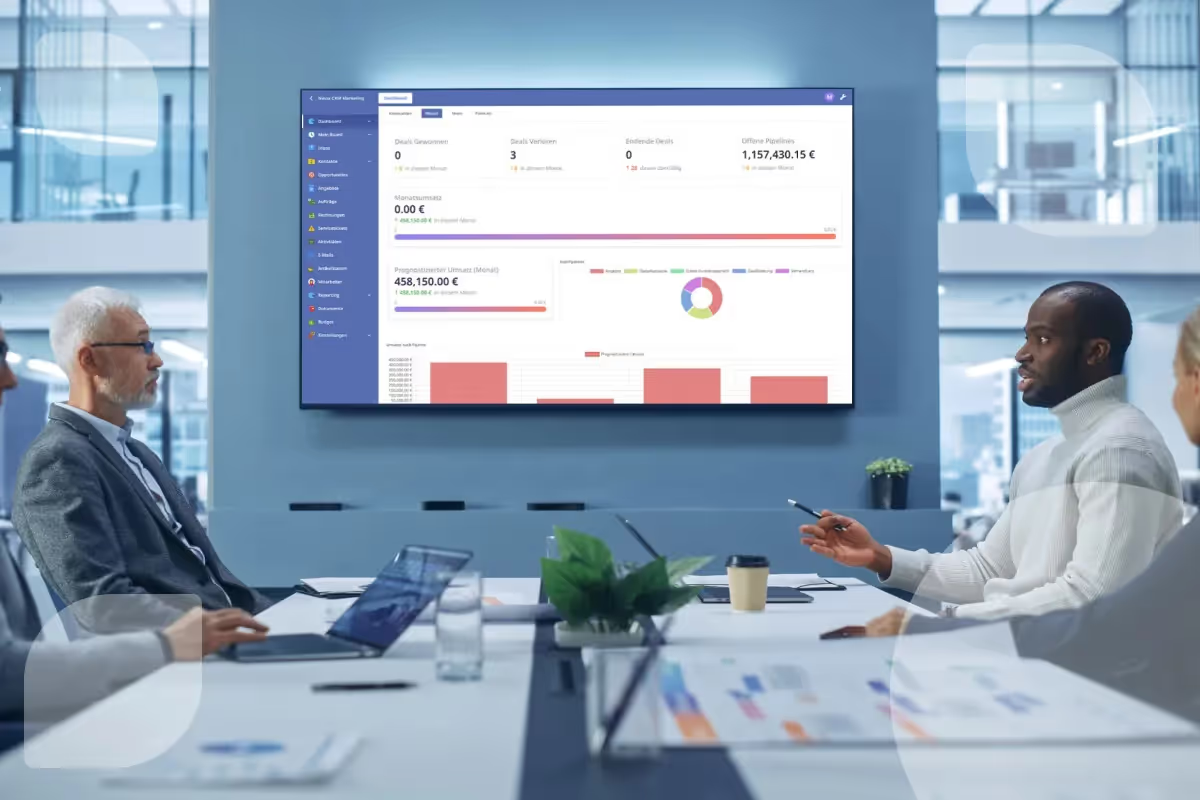CRM modules for sales processes and field service

Maximize your Sales success and customer loyalty with tailor-made CRM modules and components that are specifically tailored to your sales processes. Find out when a CRM becomes essential for sales and which functions are essential.
Why CRM is so important for sales
CRM (customer relationship management) is crucial for sales because it is the best tool for managing contacts. With a CRM system, sales teams can organize their customers efficiently and centrally. This enables them to segment and prioritize customers. This approach allows them to identify potential customers and hot leads particularly quickly and focus on the contacts that offer the greatest profitability. This means that sales employees concentrate fully on valuable contacts and can close deals faster than without CRM.
In addition, reports in the CRM system help to assess deal opportunities and sales forecasts. These evaluations give the sales team important insights to adjust their sales strategy and make the best decisions.

Another advantage of a CRM system is that it helps to intensify customer loyalty. All communication processes are recorded in the system, which makes it a valuable source of information. To find out when it's time to contact a customer again, just take a look at the CRM. Through this close customer service, sales teams can build sustainable and long-term customer relationships. At the same time, it is particularly easy to respond to individual needs and preferences.
Signs of adopting a CRM system
Implementing a CRM system can be a transformative experience for companies. If you're unsure whether your company needs a CRM system, keep in mind that a powerful customer database is right for virtually any company that wants to work faster, more personally, and more efficiently and communicate better with customers. By implementing a central platform, you create synergy between marketing, sales and customer service and take your sales process to a new level. Marketing can generate leads and seamlessly transfer them to the CRM system, from where the sales team has access to the contact details and can send suitable offers directly.

Although implementing a CRM system is always worthwhile, there are certain scenarios that are clear signs that you lack contact management:
- You sell too little, take too long to answer customer inquiries and lack effective sales processes.
- You don't segment your customers, which makes it difficult to implement targeted marketing and sales strategies.
- Your customer retention rate is poor and you're struggling to retain existing customers over the long term.
- Marketing, sales, and customer support don't work together, resulting in inconsistencies and inefficient processes.
- You can't clearly differentiate between profitable and unprofitable customers and allocate your resources accordingly.
- Your customer data is inaccurate or fragmented, making it difficult to analyze and understand customer relationships.
- You don't make data-based decisions, but rely on gut feeling and assumptions.
If you recognize one or more of these signs, it's high time to integrate a CRM system to improve your business processes.
The most important CRM functions for the sales process
Certain CRM functions are of great importance for an effective sales process. Here are a few key features that can help companies optimize their sales process:
contact management
Contact management is a central function of the CRM system. It allows companies to store comprehensive information about their contacts, including contact details, communication histories, shopping behavior, and preferences. Effective contact management helps sales staff better maintain customer relationships, identify individual needs and create personalized offers. With a central database, employees can quickly access relevant information and offer better customer service.
Lead Management
With lead management, companies can record potential customers (leads), track their qualification and plan appropriate sales activities. The lead scoring feature allows sales teams to prioritize leads based on various factors, such as demographics, interactions, or purchase intentions. This helps to make targeted use of sales resources and focus on promising business opportunities.
task management
Task management within a CRM system enables sales staff to effectively organize and prioritize their tasks. You can schedule and track activities such as calls, emails, meetings, and follow-ups. The automatic assignment of tasks, reminders, and notifications helps the team keep track of their activities and ensure that no important to-do is dropped.
Reporting and reports
With a CRM system, companies can monitor sales performance, pipeline status, revenue forecasts, and other relevant metrics. This information helps to evaluate the effectiveness of the sales strategy, identify bottlenecks in the sales process, and plan measures to optimize sales performance.
automation
Automation functions in the CRM system make routine tasks more efficient. Sales processes that are particularly easy to automate include:
- creating automatic email notifications,
- planning follow-up activities, or
- triggering workflows based on specific events
By automating repetitive tasks, sales teams can work more effectively, save time, and focus on interacting with customers in person.
integration
The seamless integration of the CRM system with other business applications is critical to improve the flow of information and facilitate collaboration. Integration with email programs, shop systems, calendars, marketing tools and other systems enables sales staff to store all relevant data in one place. This increases efficiency and at the same time reduces the risk of data inconsistencies.
Mobile working
In today's mobile working world, it's important that salespeople can access their CRM data even when they're on the go. The so-called field service is an important CRM function, especially for sales representatives. Mobile apps give sales representatives access to customer information, document their work, and update customer histories. This strengthens local customer service and optimizes the sales process from anywhere.





%20(1).avif)








